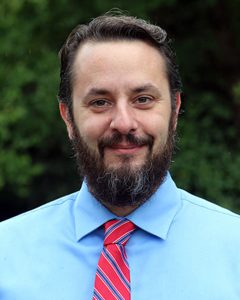
Robert Malinowski, 2018-19 Lilly Fellow
Assistant Professor Robert Malinowski works in the College of Human Medicine’s Office of Medical Education, Research and Development (OMERAD). As a recent Lilly Fellow, Rob sought to learn more about the competency-based review process within the College of Human Medicine. Below, Robert provides some insights on his project as a Lilly Fellow.
Can you tell me about your time as an AAN Lilly Fellow?
I really enjoyed my year as an AAN Lilly Fellow. At that time, I hadn’t been with the College of Human Medicine (CHM) for very long. The experience gave me an opportunity to do a deep dive into CHM’s new Shared Discovery Curriculum. Meeting with the Lilly group each month was very beneficial and exposed me to diverse perspectives. AAN provided a great framework, along with deadlines, to help keep me on track. I needed that structure, and their guidance, as I worked through my project.
What was the project you created?
CHM’s new Shared Discovery Curriculum has several unique elements. It’s completely competency-based and students start having meaningful clinical experiences a few weeks after they start the program. At the end of each semester, a group called the Student Competence Committee (SCC) reviews each student’s performance to determine if they can proceed to the next course. In many ways, it’s similar to a faculty annual review. The SCC consists of 48 elected and appointed faculty members. They look at assessment data (performance on progress tests, assignments, etc.), as well as peer feedback and attendance patterns, to form a holistic view of each student.
I chose to focus on the Student Competence Committee (SCC) for my project as it plays a crucial role each semester. We spend the last three weeks of each semester thoroughly reviewing students and determining final grades, so it’s a significant time commitment. I wanted to learn more about how the SCC members viewed the process, how they carried out their reviews, and what we could do to improve our procedures. We have a daunting task of reviewing nearly 800 students each semester, so even minor improvements could have major impacts. I developed a survey to determine how the SCC members were using Just in Time Medicine (JIT), which is the system we developed to track all of our assessments in the new SDC curriculum. I also conducted two focus groups for an in-depth discussion of what worked well, and what needed improvement. The feedback from the SCC members was extremely useful and will be incorporated into our processes in the future. Since we developed JIT in-house, we’re able to refine the system and also add additional functionality. I found my Lilly experience to be very useful on multiple levels. It was an impetus to develop an in-depth understanding of the new Shared Discovery Curriculum, as well as the inner workings of the Student Competence Committee. It also helped me to further develop my skills in educational research. The end product was very practical and led to improvements in the Student Competence Committee, which is a crucial aspect of our new curriculum.
How did the AAN (and your mentors) assist you in creating the project?
Dr. Gary Ferenchick was my primary mentor and helped to guide me on my project. Just in Time Medicine (JIT) was his creation, so his insight was very valuable. Dr. Heather Laird-Fick, Director of the Office of Assessment, also played a crucial role. Drs. Patti Stewart and Sarah Gretter from AAN were extremely helpful. They provided the structure and guidance I needed to develop my project.
How do you hope this will impact MSU on a broader scale?
What we’re doing at CHM is very unique at this point, but I believe it could be useful across campus, especially in the other health colleges (COM/CON/CVM). What we’ve created (competency-based curriculum, progress testing suite, Student Competence Committee, system for tracking assessments) may be of interest to others. I love collaborating and my Lilly experience has helped to open doors and make new contacts all across campus.
Why did you apply for the AAN Lilly Fellows program?
I’ve been involved in administration and management for the past several years but really missed the teaching and research aspects. The Lilly Fellows program seemed like a great opportunity to become reacquainted with educational research. I knew I would need guidance (and deadlines) as I transitioned, so it worked out well. The timing also seemed perfect; the new Shared Discovery Curriculum had just launched, so there were plenty of opportunities.
How did participating in the program advance your research skills?
Participating in the Lilly program helped me to realize all of the research opportunities that are available with the launch of a new curriculum. My Lilly project was a great way to get back into the research frame of mind.
What was your biggest takeway from participating in the program?
The Lilly program helped me to develop a “dual perspective.” I wear two hats with the new curriculum and try to strike a balance between them. My pragmatic role ensures that the curriculum functions on a day-to-day basis. But now I see things through a research lens as well. How do we measure if the curriculum is working? How do we validate what we’re doing? Are our methods transferrable to other medical colleges?
Learn more about the Lilly Fellowship Program

